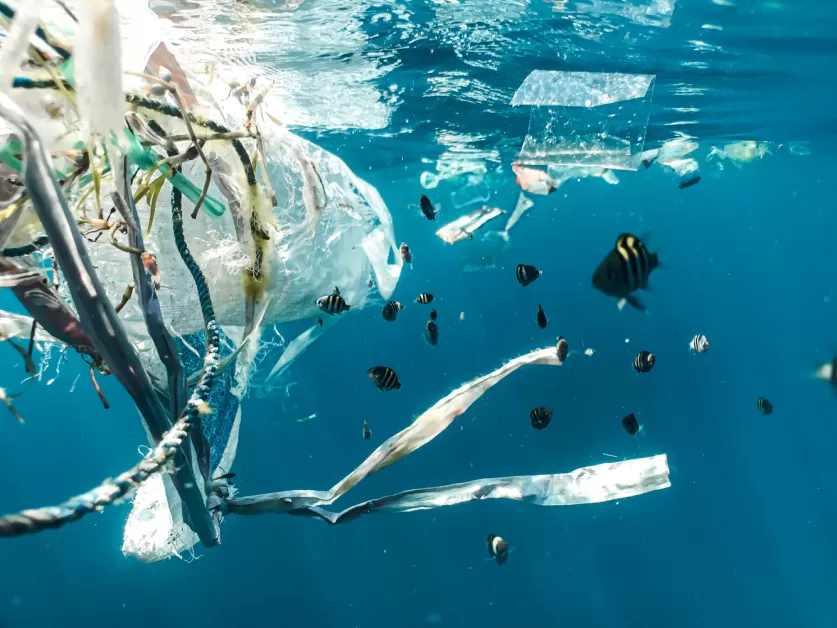Plastic bags are one of the biggest threats to the environment. Trillions of them are used each year and most end up in landfill sites or littering our streets. Plastic bags are made from polyethylene, and like most plastics, continue to exist for many years after they are discarded.
So, are biodegradable plastic bags the answer? We find out whether biodegradable plastic bags are an option and if they decompose.
Can You Buy Biodegradable Plastic Bags?
Yes, biodegradable plastic bags are available to buy in the form of trash bags. Some shops will also give you biodegradable carrier bags when you make a purchase.
Although these bags are marketed as being biodegradable, there are several problems which actually prevent them from being an eco-friendly option.
Are Biodegradable Plastic Bags Good for the Environment?
No, they are not. This is because like most plastic, they continue to exist for many years after they are last used.
1. Most Biodegradable Plastic Ends Up in Landfill
Nothing biodegrades efficiently in a landfill site.
The Environmental Protection Agency (EPA) requires that landfills remove air, moisture and sunlight. These elements are vital for biodegradation.
This means that most “biodegradable” plastic bags will sit in landfill for years, unable to decompose.
Some companies claim that their bags have a biodegradable additive (a special film) on their plastic bags that allows complete biodegradation, but this claim has been challenged in court.
2. Biodegradable Plastic Bags Can’t Be Recycled with Other Plastics
The other problem is that these biodegradable bags need to be recycled separately.
This is related to those numbers you often see on plastic bottles.
A No. 1 and a No. 2 plastic be recycled together, but add a biodegradable bag – a No. 7 plastic – and you contaminate the entire “recyclable” load.
In other words, if a No. 7 plastic is mixed in and melted down with plastics labeled No. 1 or No. 2, it would contaminate the entire load because the chemical composition of biodegradable bags is so different to regular types of plastic.
3. Biodegradable Plastic Bags Can Cause Air Pollution
When biodegradable trash bags end up in landfill sites, decomposition happens at a much slower rate.
Methane gas is then released into the atmosphere. Methane actually contributes 20 times more to the greenhouse effect than carbon dioxide over a 100 year period.
This is a huge source of air pollution.
Are Plastic Bags Compostable?
Yes, they are.
Compostable plastic bags are now widely sold and are a far better alternative to biodegradable plastic bags. Although the two terms are used interchangeably, they are two completely different things.
1. Compostable Garbage Bags are Regulated
Compostable trash bags meet an industry standard that is approved by several governmental agencies. Look for the certification of BPI certified (Biodegradable Products Institute). This guarantees that your compostable trash bags will do what they’re supposed to.
Compostable material like vegetables, coffee grinds, nut shells, garden clippings and leaves will compost naturally and quickly in these bags.
2. Compostable Trash Bags are Actually Compostable
Never throw a biodegradable trash bag onto your compost pile and expect it to decompose. It can’t as the temperature will never get hot enough. In contrast, compostable trash bags will turn into compost over time.
One benefit of composting is that it will reduce greenhouse gases. It does this because compost helps soil to absorb carbon.
One study showed that applying half an inch of compost to just 5% of grazing land in California would absorb a year’s worth of co2 output from California’s agriculture and forestry industry.
3. Compostable Trash Bags Have a Viable Disposal Process
Biodegradable plastic bags are difficult to recycle and don’t decompose. But there are composting facilities across the country which will accept your compostable plastic bags.
The American Chemistry Council (ACC) recommend this method if you don’t have a compost heap at home.
Use findacomposter.com to find a composting facility near you.
Conclusion
If you’re looking for an environmentally friendly alternative to biodegradable plastic bags, look into buying compostable plastic bags instead.
They are perfect for composting and there are several ways to dispose of them sustainably unlike conventional plastic and biodegradable plastic bags.
